Memoirs of a Geisha
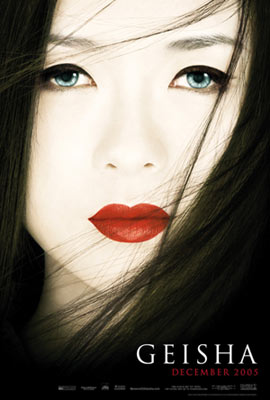
As a major Christmas movie release, Memoirs of a Geisha can best be described as a strikingly beautiful package wrapped with care, but when you tear apart the beautiful exterior and look within, you find very little. Here is an Oscar Bait movie that seems to have everything going for it. Based on a widely acclaimed novel, an Oscar-winning director (Rob Marshall of Chicago fame), the involvement of Steven Spielberg as Producer (he was even attached to direct at one time), some of the most haunting and memorable visuals captured on film this year...And yet, despite all the prestige trappings, you can't help but feel a little bit underwhelmed. In the end, it's all much out of about nothing, because that's all Memoirs of a Geisha is underneath all its flash - nothing.
Set primarily before, during, and after World War II in Japan, we first meet our heroine, Chiyo (Suzaka Ohgo), as a child, as she is sold to another family, and forcefully torn apart from her beloved sister, Satsu (Samantha Futerman). Sent to live in a geisha house, Chiyo becomes a slave to the house's owner, Mother (Kaori Momoi), and quickly runs afoul of the cruel and domineering geisha, Hatsumoto (Gong Li). It is not until Chiyo grows into her mid-teenage years (now played by Ziyi Zhang from Crouching Tiger Hidden Dragon and Rush Hour 2) that her life begins to change after a fateful visit from Hatsumoto's rival geisha, Mameha (Michelle Yeoh). Mameha sees great potential in Chiyo, and offers to take her under her wing, and teach her the art of being a geisha.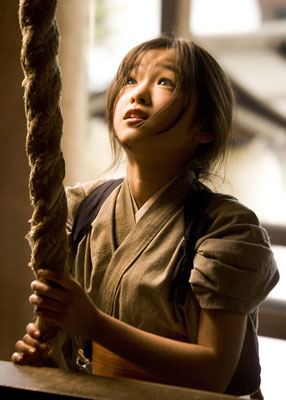 Given an almost entirely new life, and even the new name of Sayuri, the remainder of the film follows her as she learns the rules of the business. Chiyo/Sayuri quickly becomes a rising star in the geisha world, the desire of every man she meets. She quickly learns, however, that the glamorous life she has been given is not what she wants, as she is forbidden to pursue her own personal desires - namely that of a kindly older man who she has secretly been in love with for years, and goes only by the name of The Chairman (Ken Watanabe from The Last Samurai). With her loyalty divided between the man she loves and the woman who helped raise her from the depths of being a live-in slave, Chiyo begins to question just what she wants out of life, especially when the world around her begins to change as war approaches.
Given an almost entirely new life, and even the new name of Sayuri, the remainder of the film follows her as she learns the rules of the business. Chiyo/Sayuri quickly becomes a rising star in the geisha world, the desire of every man she meets. She quickly learns, however, that the glamorous life she has been given is not what she wants, as she is forbidden to pursue her own personal desires - namely that of a kindly older man who she has secretly been in love with for years, and goes only by the name of The Chairman (Ken Watanabe from The Last Samurai). With her loyalty divided between the man she loves and the woman who helped raise her from the depths of being a live-in slave, Chiyo begins to question just what she wants out of life, especially when the world around her begins to change as war approaches.
Memoirs of a Geisha has the makings for an intriguing little period piece, but it lacks the heart and the ambition. Merely scratching the surface of the world it inhabits, we feel a curious distance the entire time we watch the film. For a movie that's supposed to be a "memoir", this is pretty bare bones stuff, as we learn so little about its lead character and the world she inhabits. Instead of an in-depth look at the world of a geisha in the early 20th Century, the movie supplies us simply with music montages and random scenes of training that don't even bother to explain what the characters are doing. It's almost like the filmmakers themselves don't even care about the story they are trying to tell. I have not read the novel that inspired this film, but it is supposed to be full of detail and very historically accurate, according to those who praise it. Of course, I can only assume this, as none of this comes through in the screenplay by Robin Swicord and Doug Wright.
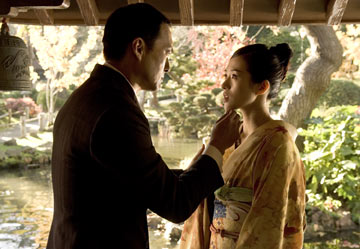
Instead of flowing naturally, the story and plotting seems rushed and forced, even with an almost 2 and a half hour running time. Chiyo goes from lowly slave girl to rising geisha in the span of just ten or fifteen minutes. We don't get any sense about the struggle she had to go through to get to where she is, as her entire training is pretty much covered in one montage sequence. Characters, and indeed entire plot elements, seem to come and go as the screenplay sees fit. Perhaps most befuddling of all is the central love story between Chiyo and The Chairman that is supposed to drive the main character's life. We never get a sense of any sort of relationship between the two, as the closest they ever seem to get is a scene early in the film where they meet on the street when Chiyo is just a child, and share food together. Why this one single moment that lasts for only two minutes in the film is enough to make her long for him the rest of her life, the movie fails to explain. In fact, if it were not for the voice-over narration provided by an elderly Chiyo who keeps on reminding us how much she loved him even after all this time, I never would have guessed that there was anything between the two. Their overly shallow relationship makes the all too perfect and tidy ending all the more hard to swallow.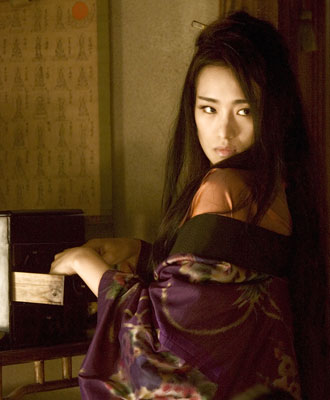 Much attention and controversy has been created over the fact that director Rob Marshall cast mainly Chinese actresses in the roles of Japanese women. Although I can certainly understand why that fact would be upsetting to some people, I certainly can't fault the performances. Ziyi Zhang stands out in her first entirely English-speaking role as the main character, as does young Suzaka Ohgo as the child version of her. Youki Kudoh is also memorable as Pumpkin, a childhood friend of Chiyo who is forced to become her rival in the geisha world, and goes through a drastic change in personality once American soldiers start occupying Japan. But the real star performance in the film belongs to Gong Li as the manipulative, hateful, and cruel geisha, Hatsumoto. Though her character is one-note, she is able to demand our attention every time she is on the screen. Of the lead performances, only Ken Watanabe as The Chairman comes across as unmemorable, as his character and the performance that accompanies it is extremely dry, uninteresting, and lacking in personality.
Much attention and controversy has been created over the fact that director Rob Marshall cast mainly Chinese actresses in the roles of Japanese women. Although I can certainly understand why that fact would be upsetting to some people, I certainly can't fault the performances. Ziyi Zhang stands out in her first entirely English-speaking role as the main character, as does young Suzaka Ohgo as the child version of her. Youki Kudoh is also memorable as Pumpkin, a childhood friend of Chiyo who is forced to become her rival in the geisha world, and goes through a drastic change in personality once American soldiers start occupying Japan. But the real star performance in the film belongs to Gong Li as the manipulative, hateful, and cruel geisha, Hatsumoto. Though her character is one-note, she is able to demand our attention every time she is on the screen. Of the lead performances, only Ken Watanabe as The Chairman comes across as unmemorable, as his character and the performance that accompanies it is extremely dry, uninteresting, and lacking in personality.
More so than the strong performances, it is the visuals that keep our interest even when the storytelling is at its worst. The filmmakers have crafted an overly beautiful vision of Japan where cherry blossoms seem to line every corner, and brilliant colors fill even the darkest and seediest alley. Sure, it may not be very realistic, but no one can deny that this is one of the better looking films of the year. There are a number of stunning sequences, the highlight belonging to a performance that Chiyo/Sayuri gives where she dances on stage under falling snow. The end result is mesmerizing, and briefly snaps us out of the near sleep-inducing coma that the film's narrative has put us in by that point. It's quite clear that the filmmakers had visions of Oscar in their eyes when they made this thing. I'd say the cinematography and visuals are the only chance this movie has.
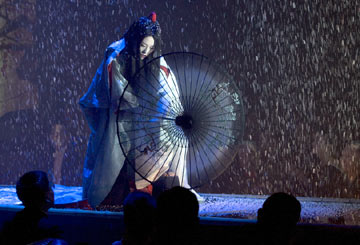
Memoirs of a Geisha is an altogether frustrating film because you can see so much promise. If the movie had just dug a bit deeper, and actually cared about its characters, its world, and its time period, this could have been something special. Instead, the movie just coasts along, giving us candy for the eyes, but nothing to go with it. The movie doesn't even bother to tell us how much time has passed during the story, as there are no subtitles to inform us of the year, and the movie seems to jump from one stage in Chiyo's life to the next with little or no reason. The film's title promises us a deep look into the life a person. All it gives us is a mere passing glance.
See the movie times in your area or buy the DVD at Amazon.com!






0 Comments:
Post a Comment
<< Home